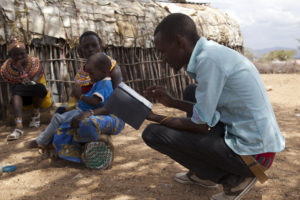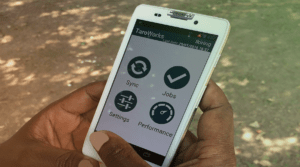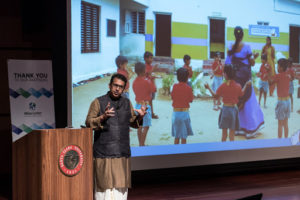
Search
“Why do so many impact technology startups fail,” I wondered upon joining TaroWorks in January 2017 amid its pivot from Grameen Foundation’s in-house software product to a freestanding social enterprise. “And what’s different about the ones that succeed?”
My friend Mark Straub, who has spent years making impact venture investments, had a ready answer:
“Most of the startups working in the impact sector, fail to understand that developing a product alone is not enough to succeed. They spend all their time on product and little or no time innovating on the business model needed to bring that product to market and create a economically viable company.” (Mark is now putting these insights to work building Smile Identity which is bringing identity services to African markets.)
Research by the Failure Institute on why some social enterprises in Mexico have failed builds on this insight by pointing to – among other things – a lack of financial acumen needed to find and secure investment capital crucial to helping businesses scale. The challenges include:
“… the lack of support funds for social entrepreneurs, as well as ignorance as to how to get funded and the lack of skills to integrate projects to obtain social funds.” wrote Leticia Gasca, Executive director of the Failure Institute. “A piece of advice for social entrepreneurs: In order to create an impact, it is relevant to possess the hard financial skills that will help you obtain investment and grow your business.” (Read More)
Interestingly, TaroWorks, which sells an offline field services app to organizations operating in developing countries, exists precisely because our parent company, Grameen Foundation, knew that it needed to solve these kinds of problems.
 Image: TaroWorks in use in Northern Kenya by a field agent from The Boma Project. Source: TaroWorks
Image: TaroWorks in use in Northern Kenya by a field agent from The Boma Project. Source: TaroWorks
In 2012, a team within Grameen began developing a field services platform to manage remote operations of Grameen’s own agriculture and health projects in areas with little to no connectivity. Based on Android and integrated with the Salesforce.com cloud database, Grameen designed the app to address key problems of network connectivity and field staff usability that were limiting its productivity and reach.
While Grameen used insights from its internal projects to develop the software, generous support from Qualcomm Wireless Reach, Cisco Systems, the eBay Foundation and others funded this development. Because issues of network connectivity and field staff usability are blockers for other businesses and NGOs working in communities at the base of the pyramid, Grameen even succeeded in selling the software to several other impact organizations including Fair Trade USA, Trees for the Future, and Cocoa Care.
So while the TaroWorks team was succeeding, we were finding it increasingly difficult to operate like a business while embedded in an NGO like Grameen. One example: NGO cost accounting systems used to manage overhead cost recovery from grant-funded projects made it difficult to understand the true cost structure of the TaroWorks software-as-a-service business.
Grameen also realized that grant funding does not last forever. To fulfill its potential as an enabling platform for improving lives in underserved communities, TaroWorks needed to pivot in hopes of becoming commercially sustainable. To do that, it needed to focus on technology sales and marketing, skill sets outside of the traditional NGO program staff experience. It also needed to put itself in a position to raise investment capital if it became clear that was needed to scale the business. It needed to spinoff from Grameen.
As the saying goes, good decisions come from experience and experience comes from bad decisions. Grameen understood the necessity to spinoff TaroWorks because of experience with past projects.
“We have a strong culture of testing and incubating solutions that can break through the constraints of poverty. That has shaped how we look at the life cycle of non-profit technology initiatives. TaroWorks has benefited from our experience with projects like Mifos, which could have been spun off earlier, and the Community Knowledge Worker initiative, which needed a different business model to thrive,” noted Steve Hollingworth, Grameen Foundation president and CEO.
Stories like this are common in other industries as well. Clayton Christensen concluded his classic technology management book “The Innovator’s Dilemma,” with his observation as to why established firms have a difficult time building innovative, disruptive technologies.
“Despite their endowments in technology, brand names … and just plain cash, successful companies populated by good managers have a genuinely hard time doing what does not fit their model for how to make money. Because disruptive technologies rarely make sense during the years when investing in them is most important, conventional managerial wisdom at established firms constitutes an entry and mobility barrier … [To succeed in developing disruptive technologies, managers] need to create a context in which each organization’s market position, economic structure, developmental capabilities and values are sufficiently aligned with … the very different work of sustaining and disruptive innovators.” (pg 228)
By “create a context”, Christensen primarily means establishing separate “commercial organizations that match … the market they are to address.” (pg 121), as Grameen did when it created TaroWorks as a stand-alone company in 2015.
The TaroWorks pivot to impact venture has been successful thus far, both as measured by its impact and commercial viability.
As a platform to enable field staff and case work in underserved communities, more than 5,000 people at 50 NGOs and businesses use TaroWorks in more than 40 countries across Africa, Asia, Latin America and the Caribbean. Collectively, these organizations use TaroWorks to improve the lives of 6 million people and support 200,000 micro-entrepreneurs. Commercially, our growth has us on a path to near-term cash-flow breakeven. We would not have achieved this if we remained an internal technology project at Grameen.

Image: TaroWorks app dashboard on Android mobile device. Source: TaroWorks
But we’ve had to change in order to survive. While Grameen’s heritage of technology development served us well, we’ve had to learn a different set of skills around sales, marketing and customer success. In true start-up fashion, we not only had to pivot but become much leaner in the process.
And while the pivot was a necessary step for our success, this spinoff was not a sufficient step in and of itself. We would not have succeeded without the continued (albeit decreasing) support from Grameen as well as Qualcomm Wireless Reach, Cisco, and eBay. These supporters have filled a gap in the impact investing ecosystem that exists between impact equity investors who focus on small, local initiatives and bigger impact equity investors who look for traditional, market-rate returns. I don’t think that TaroWorks — a global platform initiative with strong but not viral growth — would have made it without the support of grant funders who are willing to invest in tools that increase the capacity of the ecosystem to deliver impact.
The spinoff has also prompted a strategic pivot from our roots as a mobile data collection tool. TaroWorks and Grameen’s interests still align on the vast majority of issues, even as TaroWorks pivots toward social enterprises who need to manage offline business operations.
For example, we are developing features to help businesses and NGOs better deliver their services and products to the last mile, with functions like inventory tracking, supply-chain cost tracking and support for mobile money. As a result, we are putting less emphasis on updates to our survey library of PPI surveys (a poverty measurement tool co-developed by Grameen), which no longer makes economic sense for TaroWorks.
The pivot to social enterprise has also necessitated TaroWorks’ focus on the type of fundraising groundwork the Failure Institute’s research indicated was in short supply among companies like ours. This year, TaroWorks was accepted into the Global Social Benefit Institute (GSBI), an accelerator program run by Santa Clara University’s Miller Center for Social Entrepreneurship. As part of the program, we’ll be presenting TaroWorks to social impact investors on August 15, 2018 during GSBI’s annual investment pitch event.

Image: GSBI social business accelerator program participant presents his business to potential investors. Source: Santa Clara University’s Miller Center for Social Entrepreneurship
At the end of the day, while the ICT4D sector has some unusual features, the fundamentals of selling new technology products to emerging market businesses and NGOs are not much different from selling technology in the US or Europe. Insights from books like Christensen’s The Innovator’s Dilemma and Geoffrey A. Moore’s Crossing the Chasm still apply.
Any development organization thinking about what to do with a technology project like TaroWorks, would do well to keep the following in mind:
Editor’s Note: A version of this article appeared originally on NextBillion’s blog.
POST TOPICS
NEXT POST
Sign up to receive emails with TaroWorks news, industry trends and best practices.
TaroWorks, a Grameen Foundation company.
Site by V+V